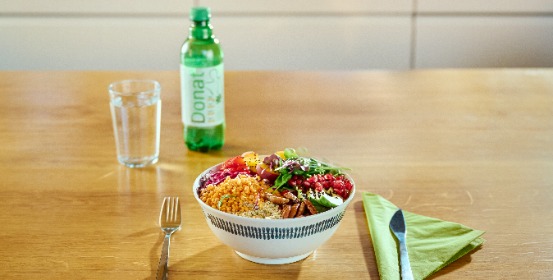Our brain and digestive system are closely connected. This connection operates in both directions: our mental state influences the dietary choices we make, the digestion of food, and its metabolism, while on the other hand, nutrition can worsen or improve our mental health. This relationship is complex and depends on many factors. One of them is the daily exposure to stress, which affects our digestive, nervous, and endocrine systems, as well as our gut microbiota. Although the stress response is our way of adaptation, it can strain the body in the long run. The steps that occur involve three phases of the stress response. In the first phase, under the influence of the hypothalamus, glucocorticoids are released from the pituitary gland, followed by adrenaline and cortisol from the adrenal gland. Our pulse increases, blood pressure rises, and the level of glucose in the blood goes up. In the second phase, our body tries to return physiological functions to a normal level through the parasympathetic system, lowering blood pressure, heart rate, and blood glucose levels. However, nowadays, we often find ourselves in situations where stressful situations persist or last for an extended period, such as work crises, personal life challenges, illness, job loss, and so on. In this case, our body enters a state of readiness and continues to release stress hormones into our bloodstream, leading to long-term exhaustion and a weakened resistance to stressors. Constant cortisol secretion stimulates insulin release, directly influencing the accumulation of visceral fat. Excess fatty tissue acts as a stimulus on the hypothalamic-pituitary-adrenal axis, creating a vicious cycle of stressors and fat accumulation. All of this is connected to our diet, the choices we make, and ultimately, our overall health.

How Does the Brain Affect the Digestive System?
Sensory information from the digestive system is transmitted through the vagus nerve, whose nerve endings are located in the intestines. They respond to various stimuli, such as information related to the food we have just eaten, triggering specific mechanisms in the digestive system that facilitate the breakdown of food. Studies on mice show that during chronic stress, the mechanosensitive abilities of vagal nerve endings are dysregulated. It is revealed that the nerve endings of the gastric mucosa become hypersensitive and tense after chronic stress, with increased contractions and stretching of the stomach muscles. This contraction and stretching of the stomach muscles are crucial for regulating the feelings of satiety and hunger, which may be associated with appetite disorders and a common consequence known as functional dyspepsia. Therefore, it is not coincidental that individuals exposed to chronic stress often experience indigestion, accompanied by tension, post-meal pain, and common symptoms such as gas, bloating, constipation, or diarrhea. Due to the dysregulation of feelings of satiety and hunger, a person may overeat or, conversely, not eat enough.
On the other hand, stress influences our dietary choices. Studies on humans show that in some individuals psychosocial stress can increase cravings for certain foods, such as sweets, fast food, and the like, while others may experience a loss of appetite. This fact highlights how individualistic we are and that how we cope with stress can affect our preferences in meal selection.
What about our Gut Microbiota?
The digestive system is inhabited by over 10 trillion bacteria. These bacteria and their biological products communicate with our brain and influence our behavior. Infections, the use of antibiotics and medications, highly processed foods with high additive content, lack of sleep, and chronic stress – all of these can disrupt the balance in the gut microbiota, leading to consequences such as increased gut permeability, the onset of various systemic diseases, compromised immune function, and even mental health issues. It is now known that our response to stress and its chronic presence also affects our microbiota, including its diversity and abundance. Recent research has been focused on modifying diet and lifestyle, as well as using targeted probiotic cultures, to help people cope with chronic stress and its consequences.
How to Help Oneself in a State of Chronic Stress
We often become so accustomed to stress that we no longer notice it. Somehow, we adapt to it, and it becomes a part of our daily routine. Unfortunately, we only confront stress when we start experiencing other health problems. However, there is a way to help our bodies cope and break free from a stressful state through our behavior. Here, we cannot single out just diet; instead, we must consider the entire lifestyle.

Where to Start?
Firstly, we need to align our sleep with the circadian rhythm, ensuring the body gets a night’s rest between 10 PM and 6 AM, necessary for the regulation of hormones and body recovery. After waking up, we should spend at least half an hour in daylight, and in the evening, 2 hours before bedtime, turn off all screens, practice breathing exercises and relaxation, and meditate. This helps regulate cortisol, the stress hormone. We need to adopt the habit of consciously practicing breathing and relaxation exercises throughout the day. If you have trouble falling asleep, a good option is to eat a portion of sour cherries or drink a glass of sour cherry juice before bedtime. Sour cherries contain melatonin, which helps us fall asleep more easily. Melatonin can also be found in pistachios, eggs, milk, sardines, almonds, and figs.
For relaxing the vagus nerve, recommendations include listening to music, laughing, watching comedies, taking cold showers, and gargling water. Everyone will find a method that suits them, and it is enough to listen to your body to know what relaxes you. Diet plays a significant role in all of this. The Western diet to which we are exposed promotes chronic inflammation, dysbiosis of the microbiota, and a chronic lack of essential nutrients and protective substances. That is why the golden standard for nutrition in case of stress is the Mediterranean diet. This diet is rich in fresh vegetables and fruits, fish, seeds, and nuts. Through such a diet, we obtain nutrients that support our mental health, such as amino acids (tyrosine, tryptophan, and glutamine), minerals (zinc, copper, iron, iodine, selenium, and magnesium), and vitamins (especially B-group vitamins: B1, B2, B3, B6, B12, and folate). We must not forget omega-3 fatty acids, which play a significant role in the synthesis and function of neurotransmitters in our brain. It is advisable to avoid highly processed foods containing many additives in our diet, especially artificial sweeteners, colors, flavors, and preservatives, as many of them are associated with a negative impact on our gut microbiota. We should include probiotic foods in our diet such as kefir, yogurt, fermented vegetables, etc. This will help diversify our gut microbiota, and the fiber from vegetables and fruits will nourish it. Special attention should be paid to foods that are a source of the amino acids tyrosine and tryptophan. These amino acids are precursors to serotonin, the so-called ‘happiness hormone.’ You can find them in turkey, fish, chicken, cheese, dairy products, beans, pumpkin seeds, sesame seeds, bananas, etc.
Given that the stress response raises blood glucose levels, the worst thing we can do in such a situation is to consume more sugar in the form of sweets, cakes, and similar foods. By doing so, we impose even more stress on our bodies to deal with the excess sugar. That is why it is important to make sure that during periods of stress, we eat food with a low glycemic index and pay attention to combining foods to bring our body into a state of stable glycemia. Low glycemic index foods include vegetables, some types of fruit, and whole grains. Fats and proteins will help lower the spike in blood glucose when combining foods. Therefore, it is recommended to have meals that include all three food groups: proteins (from fish, white meat, cheese, eggs, legumes, seeds, and nuts), good fats (olive oil, seeds, nuts), and controlled amounts of carbohydrates from whole grains and vegetables, which should make up half of our plate. This way, we will provide our bodies with enough energy and protective substances while helping regulate blood sugar spikes. Additionally, due to the stress response, it is important not to skip meals, as doing so also contributes to fluctuations in blood glucose levels.

Instead of sweet snacks, the recommendation is to eat fruit and nuts. This combination supports a stable blood glucose level while simultaneously providing protective substances from fruit: minerals such as zinc, magnesium, selenium, potassium, etc., as well as vitamins C and B group, along with valuable pigments that act as antioxidants, protecting our body.
We must not forget about mindful eating, where we place our entire focus on the present moment and the food on our plate. We cut it, bring it to our mouth, and experience the smells, tastes, and texture as we chew, slowly and consciously. This is another method by which we help the body overcome stress, and aid our digestive system in better processing the food we eat.
What about Stimulants?
In times of stress, some individuals turn to increased coffee consumption, caffeinated beverages, and alcohol. Caffeine acts as a stimulant for the nervous system and metabolism precisely because it raises cortisol levels. However, caffeine intake has both positive and negative effects. The positive effects include increased alertness and awareness, improved mood, and physical resilience. On the other hand, excessive caffeine intake (more than 250 mg) can lead to insomnia, anxiety, increased urination, restlessness, rapid heart rate, etc. During a stressful period, a person can easily unconsciously exceed this dose in the desire to feel better, which only intensifies the body’s response to stress and the inability to cope with already high cortisol levels. Therefore, it is important not to overindulge in coffee and beverages that contain it.
Alcohol is often used as a method of relaxation and stress relief. However, in the case of chronic stress, the doses of alcohol that ‘help with relaxation’ very soon need to be increasingly higher. For this reason, resorting to alcohol as a method of relaxation is not recommended. In addition, alcohol has numerous negative impacts on overall health.
Food Supplements and Stress
If our diet lacks sufficient micronutrients, a controlled intake of dietary supplements is recommended. However, they should not be a substitute for a balanced diet and they will not help regulate the condition independently.
Recommended dietary supplements include omega-3 fatty acids, B-group vitamins, vitamin C, magnesium, and selenium.
LITERATURE REFERENCES
Anne-Laure Tardy, Etienne Pouteau, Daniel Marquez, Cansu Yilmaz, Andrew Scholey, Vitamins and Minerals for Energy, Fatigue and Cognition: A Narrative Review of the Biochemical and Clinical Evidence, Nutrients 2020, 12, 228; doi:10.3390/nu12010228
Baber, I’Esha, “The Relationship Between Loneliness, Stress, and Alcohol Consumption Among College Students” (2018). Digital Commons @ ACU, Electronic Theses and Dissertations. Paper 79.
Bee Ling Tan, Mohd Esa Norhaizan, Winnie-Pui-Pui Liew, Nutrients and Oxidative Stress: Friend or Foe?, Oxidative Medicine and Cellular Longevity, Volume 2018, Article ID 9719584, https://doi.org/10.1155/2018/9719584
Christine E. Cherpak, Mindful Eating: A Review Of How The Stress-Digestion-Mindfulness Triad May Modulate And Improve Gastrointestinal And Digestive Function, Integrative Medicine, Vol. 18, No. 4, 2019
Deemah A. AlAteeq, Razan Alotaibi, Raneem Al Saqer, Njoud Alharbi, Maram Alotaibi, Reema Musllet, Rana Alraqibah, Caffeine consumption, intoxication, and stress among female university students: a cross-sectional study, AlAteeq et al. Middle East Current Psychiatry (2021) 28:30, https://doi.org/10.1186/s43045-021-00109-5
Germán Díaz, Sonsoles Hernández, Almudena Crespo, Alina Renghea, Hugo Yébenes, María Teresa Iglesias-López, Macronutrient Intake, Sleep Quality, Anxiety, Adherence to a Mediterranean Diet and Emotional Eating among Female Health Science Undergraduate Students, Nutrients 2023, 15, 2882. https://doi.org/10.3390/nu15132882
Janice L Raymond, Kelly Morrow, Krause and Mahan’s Food & the Nutrition Care Process 15th Edition, Saunders; 2020.
Jing Chen, Cheng Zhan, Gut–vagus–NTS neural pathway in controlling feeding behaviors, Stress and Brain 2021, 1(2): 108–127, https://doi.org/10.26599/SAB.2023.9060033
Joseph Firth at all. Food and mood: how do diet and nutrition affect mental wellbeing? BMJ 2020;369:m2440 | doi: 10.1136/bmj.m2440 1
Kirsteen N Browning, Stress-induced modulation of vagal afferents, Neurogastroenterol Motil. 2019 December ; 31(12): e13758. doi:10.1111/nmo.13758
Michael J Gonzalez, Jorge R Miranda-Massari, Diet and Stress, Psychiatr Clin N Am 37 (2014) 579–589, http://dx.doi.org/10.1016/j.psc.2014.08.004
Nikoline Bach Hyldelund, Vita Ligaya Dalgaard, Derek Victor Byrne, Barbara Vad Andersen, Why Being ‘Stressed’ Is ‘Desserts’ in Reverse—The Effect of Acute Psychosocial Stress on Food Pleasure and Food Choice, Foods 2022, 11, 1756. https://doi.org/10.3390/foods11121756
Noah R. Wolkowicz, MacKenzie R. Peltier, Stephanie Wemm, R. Ross MacLean, Subjective stress and alcohol use among young adult and adult drinkers: Systematic review of studies using Intensive Longitudinal Designs, Drug and Alcohol Dependence Reports 3 (2022), https://doi.org/10.1016/j.dadr.2022.100039
Tariq Aziz, Ayaz Ali Khan, Athina Tzora, Chrysoula (Chrysa) Voidarou, Ioannis Skoufos, Dietary Implications of the Bidirectional Relationship between the Gut Microflora and Inflammatory Diseases with Special Emphasis on Irritable Bowel Disease: Current and Future Perspective, Nutrients 2023, 15, 2956. https://doi.org/10.3390/nu15132956
William R. Lovallo, Thomas L. Whitsett, Mustafa al’Absi, Bong Hee Sung, Andrea S. Vincent, Michael F. Wilson, Caffeine Stimulation of Cortisol Secretion Across the Waking Hours in Relation to Caffeine Intake Levels, Psychosom Med. 2005; 67(5): 734–739.
Choose chapter:






